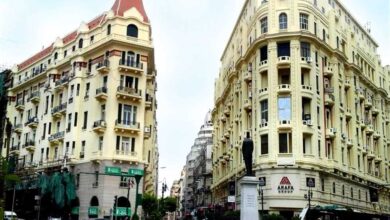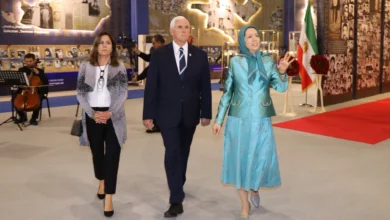
Many among the ranks of opposition forces consider the Constituent Assembly to be dominated by Islamists. Far from a reflection of the aspirations of all strata of Egyptian society, they say, the draft constitution published last week is bent toward partisan needs.
It was around this, and antagonism towards the Muslim Brotherhood, that motivated thousands to express their dissatisfaction with Egypt's dominant political group on Friday. “Free revolutionaries, we will complete the path,” opposition leaders chanted from a stage, as did their Brotherhood rivals only a week earlier; each side continues to compete for the legitimacy contained in revolutionary rhetoric up to this day.
A broad coalition of dozens of liberal and left-wing parties and revolutionary movements marched from different locations to Tahrir Square, among them the April 6 Youth Movement, the Kefaya Movement, the Constitution Party, the Socialist Popular Alliance Party and, to the dissatisfaction of many, Amr Moussa’s Congress Party. The presence of the latter reportedly led to a minor scuffle with April 6 members.
They were demanding the dissolution of the current Constituent Assembly and formation of one that represents the whole spectrum of Egyptian society, rejection of the draft constitution, the establishment of minimum and maximum wages and retribution for the revolution’s martyrs, in addition to expressing anger over rising costs of living and the acquittal of suspects in the Battle of the Camel trial.
George Ishaq, a Constitution Party leader, pointed to the underrepresentation of women in the constitution-drafting body. “Half of the Constituent Assembly members are Islamists, and women have no role. This is not the Egyptian culture and tradition,” he said.
Earlier, from the Constitution Party stage, he emphasized that the opposition will continue to resort to the streets “until women, workers and farmers are fairly represented” in the Constituent Assembly, and demanded a referendum be held for each chapter of the constitution.
Ishaq further said, “We are all the children of Egypt,” and chanted the oft-heard “one hand” slogan.
A strong motivating factor was President Mohamed Morsy’s perceived failure to deliver on his promises at bettering living conditions for Egyptians and what many see as the continuation of Mubarak-era policies. This was reflected in slogans that equated Morsy with ousted President Hosni Mubarak.
51-year-old Sabah Fawwaz, a “non-affiliated revolutionary” who is seen at nearly every protest, quotes the controversial article from the draft-constitution that subjects women’s rights to “the rules of Islamic law,” a qualification reserved for women’s rights alone. “This is only possible because of the 100 members of the Constituent Assembly, only seven are women,” she said, adding that the draft constitution contains articles that subdue the right to protest.
Fawaz further pointed out that even though Morsy claimed to have fulfilled 70 percent of his promises, he delivered on less than 10 percent. “I want to tell Morsy that we live on the same planet. Look around you and you’ll see that there is no security and no bread. And what did he do for the martyrs? The killers are still walking,” she said.
“The square is not yours.”
As promised, the Muslim Brotherhood stayed home this time, a smart move given the inevitability of repeating last week’s bloody clashes, resulting in the retreat of Brotherhood members who were chased from the square.
When one speaker demanded an apology from the Brotherhood for the violence, whom he held fully responsible, the crowd surrounding the stage was quick to reject his words through booing and hand-gestures. Where some sympathy existed previously, many protesters indicated that last week’s violence marked a permanent break with the “Supreme Guide’s rule.” In other words, it was too late for an apology.
“The Brothers want to monopolize the political system. They want to be the opposition and the government at the same time,” said Maged Khaled Abdelwahid, a 35-year-old technical engineer, who was commenting on the Brotherhood’s attempt at “hijacking” last week’s opposition protests.
Protesters present at Friday’s rally blame the blood that was spilled on senior Brotherhood leaders. The Brotherhood mobilized their members on Friday, 12 October, purportedly to denounce the Battle of the Camel acquittals, despite their knowledge of the anti-Brotherhood demonstration which had already been organized.
To many, this signals an anxiety felt among the highest ranks of the Brotherhood, who tremble at the thought of anti-Brotherhood slogans resounding in the epicenter of revolutionary contention.
“They have to understand that the square is no longer theirs. Just like the revolution brought them to power, it will remove them,” said Abdelwahid, who was clapping to a song about the revolution by famous Nubian singer Mohamed Mounir.
Unaffiliated masked youth were seen holding sticks in Mohamed Mahmoud Street at the entrance of the square. They seemed more than eager to fight, were last week’s scenes to repeat themselves.
The opposition is not perfect either
Adel Abdu Mohamed, a 50-year-old construction worker, could not hold back his tears. He explained how he regretted electing Morsy, and cited the president’s statements from the previous day, when he rejected any attack on former military council head Hussein Tantawi and former Chief of Staff Sami Anan.
But Mohamed also felt let down by the opposition. “It is because of the elitist opposition that we had to make a choice between Morsy and Shafiq. Instead of uniting, they all went for the chair [of the president],” he said.
Problematizing Friday’s mobilization, human rights activist Mahaa Mamoun, who agreed with most of Friday’s demands, adds a critical note. She expresses disappointment over many parties’ willingness to form coalitions with former regime members, who are now amongst the ranks of “the opposition.”
“All that for the sake of fighting the Muslim Brotherhood, while the time to fight them has not come yet. They haven’t yet managed to take over institutions like the Interior Ministry or the judiciary that are still rife with feloul. So let [the opposition] focus on the Constituent Assembly, but not on removing the Brotherhood from power.”
Maamoun adds: “The square has become a prison. Most of these parties are not interacting with people outside Cairo, in villages. The only ones who do that are the Brotherhood, the Salafis and civil society organizations who are not in politics.”
Overall, a carefully celebratory atmosphere dominating Tahrir Square was punctuated with anger and short outbursts of grief.
Rida Abdel Aziz, who lost sight in both eyes during the Mohamed Mahmoud clashes of November 2011, made many cry when he read a poem from the Constitution Party stage. “Those who lost their eyes, did not lose the tears with them. All the Egyptian’s eyes are my eyes,” he read.
These words sparked ardent chanting: “We will bring their rights, or die like them,” a reference to the many killed during the revolution. Both the Brotherhood, and the parties present at Friday’s protest, still lean heavily on appeals to the memory of the “the noble martyrs.”




